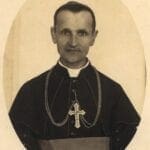This word is derived from the Latin mortificare … a word formed from mors or mortis meaning death and the suffix ficar from the Latin fiacre, the root facere which means to do or to make.
For Vincentian de Paul mortification is one of the essential characteristics of Jesus’ disciples: if people want to come after me, they must deny themselves and take up their cross daily and follow me (Luke 9:22). An authentic spirituality is that which is rooted in, lived and focused on the person of Jesus Christ.
For us, sons and daughters of Vincent de Paul, this virtue involves dying to self so that Christ might reign in us. This is the virtue of total self-giving (we place others and their needs before ourselves and our needs … this is especially so for those men and women who are poor). We will become true missionaries and we will achieve the heights of holiness if we follow in the footsteps of Jesus, if we renounce ourselves and mortify ourselves in everything.
Vincent de Paul continues to encourage this virtue which, after pain and suffering, will lead to eternal joy: Courage! Pleasure follows pain, and the greater difficulty the faithful find in self-renunciation, the greater joy they have in mortifying themselves, and their reward is great in proportion to the work entailed. So then, it is by mortification that we have to remove from ourselves anything that displeases God; it is what helps us to carry the cross with Our Lord and to do it every day, as He commands, if we mortify ourselves each day. The sign that a man is following Our Lord is to see whether he mortifies himself continually. Let us work at that, my dear confreres, so that not a day goes by that we do not perform at least three or four acts of mortification; and by our doing this, it will be true to say that we are following Our Lord, that we will be worthy of the title of his disciples, and that we will be walking on the narrow path that leads to life. By our doing this, he will reign in us during this mortal life and we with him in eternal life.
 Venerable Janez Frančišek Gnidovec, CM (1856-1939)
Venerable Janez Frančišek Gnidovec, CM (1856-1939)
Bishop Janez, a Slovenian (like our superior general), was a diocesan priest, but was attracted to the community as a result of the austere and self-sacrificing life of the confreres.
At the age of 57 he took the initial steps to become a member of the Congregation and then, five years later, was appointed the bishop of Skolpe (Macedonia), a region that extended into Kosovo and where many Orthodox Christians and Muslims lived. The Bishop’s zeal was experienced by all people because he spared no effort: he proclaimed the good news, he walked great distances during the day and the night, he listened to people’s confession until the early hours of the morning, and for his meals he was content with a little bread, a piece of cheese and a cup of tea.
Let us listen to the words of a saintly women whom we have no hesitation in believing: Bishop Gnidovec was a saint. We all called him that. He was a great priest who ministered in the likeness of Jesus’ heart … with a simple and docile heart. When he left for the missions, he celebrated Mass for me, gave me communion and blessed me with these words: “Go to the missions. Give Jesus everything, live only for Him, belong only to Him, sacrifice only for Him. May Jesus be everything in your life”. I am convinced that he prays for me and that in him I have a defender before Jesus (Mother Teresa of Calcutta).
By: Marlio Nasayó Liévano, CM
Province of Colombia
Translated:
Charles T. Plock, CM
Eastern Province, USA

